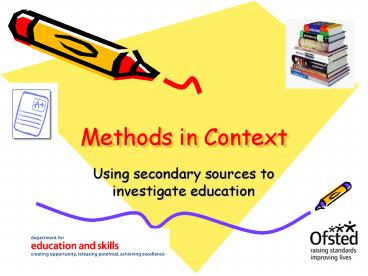Methods in Context - PowerPoint PPT Presentation
Title:
Methods in Context
Description:
Methods in Context Using secondary sources to investigate education Examples of documents in education Public School websites Dfes guidance to schools School ... – PowerPoint PPT presentation
Number of Views:77
Avg rating:3.0/5.0
Title: Methods in Context
1
Methods in Context
- Using secondary sources to investigate education
2
Examples of documents in education
- Public
- School websites
- Dfes guidance to schools
- School prospectuses
- Government enquiries
- Novels about school life
- School textbooks
- Playground songs and games
- Media reports, films about education
- Ofsted inspection reports
- Private
- Pupils written work
- School reports
- Pupils and teachers diaries
- Pupils and teachers autobiographies
- Graffiti on school buildings, desks
- Notes passed in lessons
- Absence letters
- Text messages between pupils
3
Using official statistics to investigate education
- Practical issues- much of this data is published
and thus available to the sociologist, saving
both time and money - Statistics allow sociologists to make comparisons
between different groups and also over time - However governments collect statistics for their
own purposes which may not be relevant to the
sociologist - Government definitions of key concepts may differ
to that of the sociologist
4
- Representativeness- All state schools have to
complete a school census every 3 years, because
these statistics cover every pupil in the country
they are highly representative
5
- Reliability- Positivists favour official
statistics because their reliability means they
can be used to test and retest hypotheses - However, governments may change definitions and
categories, e.g. when the conservatives brought
in league tables they were solely based on exam
results, in 2006 Labour brought in CVA which
takes into account exam results and also the
level of deprivation pupils suffer
6
- Validity- Interpretivists question the validity
of statistics. They argue that such statistics
are socially constructed. E.g. they see truancy
statistics as the outcome of a series of
definitions and decisions made by a variety of
social actors - Do schools deliberately distort their figures?
7
Using documents to investigate education
- Practical issues- Public documents on education
are often easily accessible to the researcher.
For example, David Gillborn (1995) in his study
of racism and schooling was able to access a wide
range of school documents - Personal documents can be more difficult to
access. Valerie Hey (1997) made use of the notes
girls passed to each other, however girls were
experts at hiding them from their teachers
8
- Ethical issues- Few ethical concerns with public
documents, however there are some concerns with
personal documents. For example with Hey, in some
cases the notes were offered freely but in others
she took them out of the waste paper bin so
informed consent was not obtained
9
- Representativeness- Some official documents are
legally required of all schools and colleges,
such as records of racist incidents. This makes
it more likely that we can form a representative
picture of racism in schools across the land.
However, of course, not all racist incidents may
be documented
10
- Reliability- Many public documents, for example
attendance registers, are produced in a
systematic format. This enables researchers to
make direct comparisons of the absence rates of
pupils in different schools - However mistakes when filling in registers may
reduce their reliability because teachers are not
applying the measure of attendance consistently
11
- Validity- Documents can provide important
insights into the meanings held by teachers and
pupils and can therefore be high in validity. Hey
found that the notes offered valuable insights
into girls feelings and actions - However all documents are open to interpretation.
For example, we cannot be sure that Heys
interpretation of the meanings of the notes was
the same as that of the girls
12
Task p-g 226-228
- Create a Power Point on the issues surrounding
using secondary sources to investigate education - Official statistics
- Documents






























![⚡[PDF]✔ Meaning and Context PowerPoint PPT Presentation](https://s3.amazonaws.com/images.powershow.com/10048457.th0.jpg?_=202406051010)
![[PDF] Essentials of Autoethnography (Essentials of Qualitative Methods Series) 1st Edition Android PowerPoint PPT Presentation](https://s3.amazonaws.com/images.powershow.com/10079360.th0.jpg?_=20240716083)